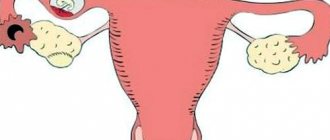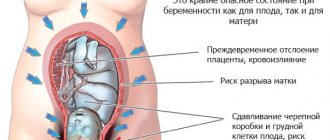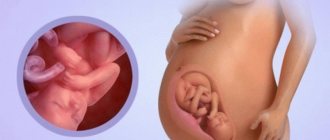Usually, with the end of the first trimester of gestation, all unpleasant manifestations associated with toxicosis end. During this period, many mothers noticeably improve their well-being, gain a charge of vivacity and energy, and want to do something grandiose, for example, make repairs or at least rearrange them. But sometimes your health is overshadowed by nausea in the second trimester of pregnancy. The appearance of such a symptom should alert the mother and force her to contact a specialist, even if this visit is unscheduled.
General health during pregnancy depends on many factors.
General characteristics of the 2nd trimester
Many mothers call the onset of the 2nd trimester the golden time of pregnancy. It starts at 12 and lasts until the end of 24 weeks.
- Due to the rapid growth and active development of the baby at this stage, the likelihood of various disorders in the functionality of the vascular and heart systems, immune or gastrointestinal structures increases. To live this period as calmly as possible, experts recommend that patients do yoga or breathing exercises for pregnant women.
- It is necessary to be more attentive and careful about your health, to avoid overwork and stressful situations, psycho-emotional experiences and insomnia.
- Due to a decrease in immune status during pregnancy in the second trimester, the body's resistance to pathogens decreases significantly. This is partly why fungal pathologies, candidiasis and lichen are quite common among pregnant women. The most common pregnancy companion is thrush. Therefore, in the second trimester it is worth taking care of the prevention of this disease, which requires normalization of the vaginal and intestinal microflora.
- When the integrity of the mucous membrane is compromised, a source opens for more dangerous infections of streptococcal, staphylococcal or fungal origin. This type of infection is often found in pregnant women. Also, heartburn often bothers mothers in the 2nd trimester of pregnancy. It’s just that the internal organs begin to gradually shift due to the growing uterus, compressing the stomach, which provokes acidity disorders.
Limb cramps are common in the second or third trimester. If such a symptom has become a frequent occurrence, then it is necessary to urgently consult a gynecologist, because convulsions indicate a deficiency of essential substances for the fetus, such as magnesium and calcium. To relieve a cramp attack, you need to step barefoot on a cold floor or pour water from a warm shower onto the cramped muscle.
Another unpleasant condition that causes mothers a lot of discomfort is nausea during pregnancy, which can be bothersome at any stage of gestation.
Timing of nausea
It is necessary to include fresh fruits in the diet.
The timing of the onset of nausea is determined by the etiology of this condition. If toxic nausea occurs exclusively in the first trimester, from about 5-6 weeks. The earlier a woman begins to worry about toxicosis, the more difficult it will be and the more likely it is that the patient will experience severe vomiting reactions that require mandatory treatment.
If nausea during pregnancy bothers you in the second trimester, then the reasons for this condition usually lie in an increase in the size of the uterine body, which causes an upward displacement of all internal organs. Moreover, even if the pregnancy as a whole is going well, in the second trimester it may well be complicated by vomiting or nausea.
During the feeding process, food first enters the stomach cavity. During pregnancy, the smooth tissues of the muscle frame become more relaxed, which disrupts the functioning of the stomach. And then the uterus squeezes the exit from the gastric cavity. All these factors seriously complicate the course of digestive processes, disrupt the emptying and movement of food masses into the intestinal structures. And when mommy tries to bend over or lie down, due to the relaxation of her stomach, she may experience nausea and vomiting. Why do you feel sick in the 2nd trimester? Typically, nausea and vomiting occur after eating precisely because the stomach is unable to process food masses in a timely manner and get rid of the contents.
Causes of sleepiness during pregnancy
Fatigue appears mainly due to the effects of hormones and increased stress. In this way, the body signals the expectant mother that she needs to rest more and take care in order to safely bear the baby. The main reasons are related to the changes that occur specifically in the first trimester.
In the early stages
The main causes of fatigue and drowsiness in pregnant women:
- Formation of the placenta. The body spends a lot of energy creating a life support system for the fetus. At this time, the woman constantly wants to sleep;
- Hormonal changes. Under the influence of progesterone, which is responsible for maintaining pregnancy, blood pressure decreases. Hence - lethargy, drowsiness, weakness;
- Iron-deficiency anemia. Expectant mothers' need for iron increases sharply. In this case, weakness, shortness of breath, pale skin are possible;
- Increased metabolism. Metabolic processes accelerate, protein consumption increases, blood pressure decreases - the woman feels weaker than usual and wants to sleep more often.
In the later stages
In recent months, fatigue and drowsiness are associated with the fact that the woman also needs to fully supply the fetus’s body. Other causes of fatigue: high or low blood pressure, diabetes, increased emotional and physical stress, acute and chronic respiratory diseases, anemia, toxicosis. In the last weeks, a pregnant woman may feel worse due to swelling, as well as discomfort in the back, legs, and frequent urination.
Causes of nausea
Normally, toxic symptoms should disappear with the onset of the second trimester, but in reality everything is somewhat different. The sudden appearance of nausea symptoms after the 13-week gestation period may indicate the development of very unsafe pathological conditions, therefore such manifestations require the mandatory participation of a specialist, additional diagnostics and examination of the pregnant woman. Experts note that the causes of nausea can be caused by pathologies:
- Exacerbations of chronic digestive diseases such as gastritis or ulcerative processes, pancreatitis, inflammatory lesions of the bile duct and its ducts, etc.;
- Poisoning. With the onset of conception, many mothers' taste preferences change dramatically, and a desire appears to eat something unusual, exotic, for example, oysters or shellfish. But you should not experiment during pregnancy. The slightest errors in the diet can lead to indigestion or poisoning. Now mommy needs to eat only thermally processed food.
- Fetal activity. When the baby begins to kick, all the intraorganic structures located around the uterine body come under attack. Pregnant women often complain that children's feet put pressure on the liver or stomach, which causes severe nausea.
- Overeating also often becomes a factor provoking the development of a nausea attack. The stomach simply cannot digest a large volume of food, so vomiting and nausea may occur when consuming a large portion.
- Hormonal imbalances also often cause the problem. Excessive content of hormonal substances or their deficiency leads to disruption of the functionality of the structures of the endocrine system. This condition may well be accompanied by attacks of sudden nausea.
- Hypotension also quite often causes nausea and vomiting. If a woman already suffered from low blood pressure before conception, then during pregnancy its levels may decrease even more, which causes unpleasant symptoms.
What else do you need to know
Late toxicosis. This condition usually occurs after 20 weeks of gestation. Preeclampsia is dangerous for pregnancy and the patient’s health.
Hypertensive manifestations can also provoke attacks of nausea; during pregnancy, the pressure on the vascular walls only increases, which aggravates the symptoms, making attacks of nausea a fairly common condition for pregnant women.
Every pregnancy is different, and everyone’s body is different. Therefore, the reasons for sudden nausea are different for each patient. Usually this condition does not cause problems, because it is easily eliminated by correcting the diet. You can drink a cup of mint-lemon tea, which will quickly relieve unpleasant symptoms. If the nausea reactions are debilitating and the patient often vomits, then it is necessary to urgently consult a specialist, because such manifestations are considered a threat and are pathological in nature.
Possible causes of headaches during pregnancy
Headaches occur in more than a third of women during pregnancy; most patients have not previously complained of such symptoms. If discomfort occurs against the background of fatigue and toxicosis, it will pass simultaneously with other clinical signs. Of particular danger are cases in which headaches occur simultaneously with nausea and vomiting, surges in blood pressure, decreased visual acuity, and even fainting. All these factors should be a reason to consult a doctor, as they can affect the normal development of the fetus.
The causes of headaches in pregnant women may vary. Doctors at the Clinical Brain Institute will be able to preliminarily determine them during the initial examination. To do this, you will need information about the conditions under which pain occurs, its duration, nature and location, as well as the conditions for its disappearance. The most common cause is migraine. This term refers to acute, throbbing pain that occurs suddenly and spreads to half or the entire surface of the head. It is accompanied by nausea, dizziness, disorders of the gastrointestinal tract and visual apparatus. Predisposing factors to its occurrence may be:
- sudden changes in temperature and humidity, weather changes;
- nervous tension, stressful situations;
- chronic fatigue, lack of normal sleep and wakefulness;
- prolonged exposure to trigger factors, including bright lights or loud sounds.
Another type is tension headache (TTH) . This is a condition that is characterized by local painful sensations that begin in the occipital or frontal lobes and then spread to the entire surface of the head. They can be of varying intensity, but do not cause nausea - this is their main difference from migraines. They are often caused by emotional tension and stress, as well as excessive physical or mental stress. The pain in most cases occurs after waking up and gradually intensifies during the day. Its duration ranges from 30 minutes to several days, but it is easily relieved with painkillers.
Cluster headaches (CHH) are a separate type. They appear when you feel well, for no apparent reason, and can last from 15-20 minutes to an hour. They are sharp, pulsating, localized at a certain point and do not spread to the entire surface of the head. Their characteristic feature is periodicity. Such pain can occur several times a day or a week, but at regular intervals.
Headaches during pregnancy are also associated with the following conditions:
- hormonal disorders and natural changes;
- diseases associated with surges in blood pressure;
- toxicosis of pregnant women and associated dehydration;
- unhealthy diet with a predominance of fatty or sweet foods, as well as an insufficiently nutritious diet;
- increased air pollution, prolonged stay in a stuffy room.
Headaches can also be symptoms of old chronic diseases that worsen during pregnancy. Hypo- or hypertension, changes in intracranial pressure, vascular pathologies - all these problems can manifest themselves as the body experiences significant stress. It is also worth understanding that old cranial herbs, which have long ceased to bother the patient, can cause headaches during pregnancy.
In the first trimester
Headaches in the first trimester of pregnancy are common. Significant changes occur in a woman’s body, to which she has yet to adapt. Among the reasons that can cause headaches in early pregnancy are:
- an increase in the total volume of blood in the vessels - it creates additional pressure and causes stretching of the vascular walls;
- increased concentrations of hormones (estrogens, progesterone), which can cause fluctuations in vascular tone;
- correction of lifestyle and nutrition, giving up certain foods and bad habits - these changes also require a period of adaptation;
- early toxicosis is a reaction of immune mechanisms to the fetus.
Early toxicosis is considered to occur before 12-13 weeks. During this period, pregnancy often proceeds without clinical manifestations, but some women complain of headache, nausea and general weakness. This reaction is caused by the immune system's response to the formation of the fetus. Normally, some mechanisms are blocked that perceive it as a foreign protein, but this process can also be accompanied by headaches and discomfort.
In the second trimester
The second trimester of pregnancy is a less dangerous period. Some women still complain of toxicosis and other side effects, but, in general, the adaptation mechanisms are already sufficiently formed. If headaches begin to occur during this period, you should pay attention to your well-being - a symptom may signal dangerous disorders. These include:
- glaucoma is a group of diseases in which there is an increase in intraocular pressure;
- sinusitis - inflammatory processes in the paranasal sinuses;
- inflammation of the brain and its membranes;
- osteochondrosis of the cervical spine is a disease that is manifested by a decrease in metabolic processes in hyaline cartilage and its gradual destruction, which leads to compression of nerves and blood vessels;
- diseases of the kidneys and urinary system are the cause of the accumulation of excess fluid in the body.
Not every headache should be a cause for concern. If discomfort continues for 5 days or more, accompanied by decreased visual acuity or stiffness of the neck muscles, you should immediately consult a doctor. In other cases, the symptom may be the result of overwork or physical stress, or lack of daily routine.
In the last trimester
In the last trimester of pregnancy, headaches can develop for several reasons, including physiological ones. An increase in body weight leads to increased curvature of the spinal column. This condition increases the risk of compression of the blood vessels that carry oxygenated blood to the brain. The result of this condition is tissue hypoxia, which is manifested by a deterioration in general health and headache. In addition, a decrease in physical activity also causes poor blood circulation. Even in the third trimester, it is worth paying attention to light physical activity.
In some cases, headaches are caused by nervous tension and stress associated with the upcoming birth. The emotional state of the mother must remain stable, otherwise it may affect the proper development of the fetus. However, such cases of headache are considered the least dangerous - they are not associated with serious internal disorders and are treated with conservative methods.
Late toxicosis (preeclampsia) is a complication of pregnancy. Nausea, swelling, and headaches in the third trimester cannot be considered normal. In addition, this condition can threaten both the health of the mother and the development of the fetus in the final stages. A diagnosis can be made if three characteristic symptoms are present:
- the appearance of edema;
- hypertension;
- the presence of protein in the urine.
Preeclampsia may be associated with insufficiency of the urinary system and kidney disease. Nephropathy can be diagnosed by a significant increase in blood pressure - this symptom may be absent in hydrops of pregnancy.
One of the most dangerous manifestations of late toxicosis is eclampsia. This is a rare form that is manifested by convulsive muscle contractions and loss of consciousness in response to any irritant. It can be a flash of light or a loud sound. Preeclampsia is a less dangerous condition, but it can also harm the health of mother and baby. It occurs without convulsive syndrome, and its main symptoms are acute headache, dizziness, and a feeling of heaviness in the forehead and occipital region. In addition, during an attack, visual impairment is observed: a veil appears before the eyes, different spots, and in some cases, temporary blindness. Additionally, there are complaints of nausea and vomiting, pain in the right hypochondrium. In such cases, pregnancy should proceed in a hospital setting so that doctors can relieve convulsions and intoxication in a timely manner without harm to the health of the mother and fetus.
Associated symptoms
Regular use of a special cream will help avoid stretch marks.
Nausea reactions during pregnancy are divided into three stages. In the first stage, nausea reactions occur rarely, accompanied by vomiting only after eating and no more than 5 times a day. at the second stage, nausea and vomiting reactions occur more often, and can also bother you on an empty stomach, appearing up to 10 times a day. At the third stage, the urge to vomit is almost constant, debilitating, and can lead to dehydration, hyperthermia, decreased blood pressure and other pathologies, and therefore require mandatory hospitalization of the patient.
The first sign of nausea in the second trimester of pregnancy is excessive salivation, which is often accompanied by a metallic taste in the mouth. If nausea attacks are regular, then mothers lose a lot of fluid, and with it reserves of minerals and proteins. Also, nausea reactions are often accompanied by depression and excessive irritability, drowsiness and fatigue, and excessive irritability. Mommy has no appetite, which often leads to weight loss, taste sensations are dulled, dermatous reactions are formed, and muscle spasms can be disturbing, which lead to asthma attacks.
Typically, the second trimester is characterized by irregular nausea; only in rare cases does it have a pathological origin, developing against the background of toxic accumulations or an increase in the level of acetone in the bloodstream. To eliminate such conditions, mothers are prescribed medications in the form of infusions, tablets, etc.
Diagnostic methods
To determine the cause of headaches during pregnancy, a set of examinations is prescribed. The first stage is a consultation with a neurologist, which includes a study of reflexes. Based on the results of the examination and initial diagnosis, additional tests are prescribed:
- general blood test - indicates an increase in the level of leukocytes in the blood during inflammatory processes, a decrease in the number of red blood cells during anemia;
- biochemical blood test - will show a deficiency or excess of important microelements, which can lead to headaches;
- additional blood tests - prescribed to determine blood gas composition, hormonal composition and other indicators;
- MRI - in the second trimester, this method can be used to assess the condition of the brain and internal organs, but if possible it is postponed until after childbirth;
- Ultrasound is one of the main ways to examine internal organs and blood vessels.
Doctors at the Clinical Brain Institute recommend undergoing an examination if headaches occur too often or with high intensity. It is also important to determine the cause of a headache that has not occurred before. Additional symptoms (nausea, dizziness, poor coordination of movements) should also be a reason for diagnosis.
Methods for getting rid of nausea
To look for ways to eliminate nausea, you must first accurately determine the causes of such reactions, for which you must definitely go to a specialist. Only a doctor will be able to accurately determine the exact causes, collect anamnesis and make a diagnosis, according to which therapy will be prescribed. To determine the exact causes, the woman is prescribed tests (including to determine hormonal status), blood pressure readings are measured, and an ultrasound examination of the gastrointestinal organs is performed. In accordance with the root cause, the doctor will select the necessary treatment.
- If food poisoning occurs, the gastric cavity is washed and enterosorbents are prescribed.
- In case of exacerbation of pathologies of the gastrointestinal system, diet therapy and the use of medications permitted during pregnancy, for example, sorbents and enveloping drugs, antacids and enzymatic agents, are indicated.
- In case of late toxicosis, conservative therapy is prescribed, drugs are used to improve blood circulation in the placental vascular canals, magnesium infusion, sedatives and psycho-emotional rest, and diet therapy.
- In case of hormonal imbalances, it is necessary to consult an endocrinologist and prescribe hormonal therapy.
In case of any deviations in health, the patient should contact the gynecologist managing her pregnancy. Self-medication is strictly unacceptable; before using any remedy, you should consult a doctor.
When urgent medical attention is needed
It is necessary to strictly follow all medical recommendations.
Experts identify several specific symptoms in which you should sound the alarm and immediately contact an obstetrician-gynecologist. So, alarming symptoms that require attention include nausea and vomiting reactions that bother the patient throughout the day. You should also consult a doctor if, due to nausea and vomiting, the patient has lost more than 2 kg or frequent vomiting is accompanied by hyperthermia and a feverish state.
You should not postpone a visit to a specialist and mothers whose vomit has a reddish-brown tint or contains distinct traces of blood. If you feel very unwell and have a rapid heartbeat at night, you will also need an unscheduled visit to the doctor. Alarming symptoms include severe vomiting at the end of the second and third trimester of gestation, as well as frequent nausea and vomiting reactions at 9 months of gestation. You need to carefully monitor your health and take appropriate measures in case of suspicious symptomatic manifestations.
Drug treatment of nausea and vomiting reaction
It is unacceptable for mothers to use any medications on their own; nausea can be treated with medications only as prescribed by specialists. Antiallergenic and antihistamines, hepatoprotectors like Essentiale or antiemetics like Cocculin or Cerucal are usually used. The doctor may also prescribe enterosorbents such as Enterosgel, Polyphepan or Polysorb.
The decision about which medications a pregnant woman should take for nausea at what time is also made only by a doctor. The time of taking medications must strictly comply with the doctor's prescription. If the nausea and vomiting reactions are severe and debilitating, the patient is admitted to a hospital and is prescribed an infusion of glucose or saline solution, vitamin preparations, etc.
Folk remedies
When nausea begins to bother you, you want to get rid of it as quickly as possible without harm to the child. You can significantly alleviate the condition of nausea and vomiting reactions using ordinary available means.
- If mommy has normal or low stomach acidity, then rye bread crackers will help eliminate the symptoms of nausea. This remedy helps even with pronounced attacks of nausea. It is enough in the morning, immediately after waking up, to dissolve 2-3 cubes of crackers before getting out of bed.
- Ginger tea also helps to cope with a nausea attack. Steam 10 g of tangerine peels and the same amount of fresh, finely chopped ginger root with boiling water (1 liter). Boil over low heat for 20 minutes and then cool. Store the drink in the refrigerator. Add 50 ml of prepared tea to a glass of hot water and drink twice a day. You can add a little honey to the drink for taste.
- Saltine crackers effectively eliminate nausea attacks, but you should not overuse them, so as not to provoke unpleasant complications due to excess salt consumption.
- A herbal decoction of lemon balm or mint, valerian or thyme helps cope with nausea. A small spoon of herb is brewed with boiling water in a 0.5 liter jar and infused under the lid. Then filter and drink 50 ml 3-4 times a day.
If you don’t have any of the above on hand, and nausea suddenly sets in, you can suck on a small piece of ice. But this remedy should also not be abused; against the background of a reduced immune status, it is very easy to develop a sore throat.
Headache Treatment Methods
Doctors at the Clinical Brain Institute say that it is dangerous to endure a headache. In this condition, hypoxia and necrosis of nerve cells gradually develop. However, drug methods cannot be completely harmless - the list of drugs allowed during pregnancy is quite narrow and excludes potent drugs. Doctors at the Clinical Brain Institute offer a simple list of rules that will help get rid of mild headaches.
- Massage is one of the best ways to relax tense muscles, improve blood flow and restore metabolic processes in tissues. At the same time, you need to massage not only the points of the head where pain occurs. It is better to contact a specialist and undergo a general massage course.
- Compresses are one way to quickly relieve pain. To do this, you can use a piece of cloth soaked in cold water or apply ice cubes. The effect of cold should not be long, 5-10 minutes is enough. Such compresses tone blood vessels and have an analgesic effect.
- Drink plenty of fluids - it is better to choose plain water or green tea. Even if there is swelling of the limbs, this is not a reason to refuse to drink fluids.
- Medicines - they must be taken only with the permission of a doctor. There are painkillers on sale that are approved during pregnancy. These include Paracetamol derivatives (No-Shpa, Efferalgan). Aspirin, Analgin and their analogues are not recommended during this period.
If you experience a mild headache, you should take time to rest. Next, it is recommended to ventilate the room and get rid of any sources of strong odors. Walking at a comfortable pace can help improve blood circulation and relieve headaches. At home, you should try to fall asleep - in most cases, the discomfort disappears immediately after waking up.
For proper treatment, it is necessary to undergo a full diagnosis. All conditions for its implementation are available at the Clinical Institute of the Brain. Doctors annually see a huge number of women with complaints of headaches during pregnancy caused by various reasons.
Even a healthy woman can experience headaches during pregnancy. However, poor lifestyle choices, overeating, chronic diseases, or old injuries increase the likelihood of this symptom. The Clinical Brain Institute specializes in the treatment of headaches caused by any pathology. There are all conditions for conducting full diagnostics and the ability to monitor patients in a hospital setting.
General advice from experts
With frequent nausea attacks, the mother’s main task is to restore the functioning of all body systems so that the baby receives the necessary nutrition, microelements, oxygen and vitamins in full. It is recommended to walk in the fresh air more often, and the room where the pregnant woman lives needs to be ventilated several times a day. Mommy must follow a sleep-rest regime and 5 meals a day, perform therapeutic exercises and sleep on her left side.
It is necessary to avoid sudden rises; several times a day after meals, you need to take a short knee-elbow position, which will help avoid the occurrence of nausea and vomiting syndrome. Also, a pregnant woman should avoid the feeling of hunger, which causes excessive salivation. You will have to stop drinking drinks like coffee or strong tea, carbonated drinks, which can cause a delay in the absorption of fluids and cause nausea.
Sometimes nausea and vomiting ailments are a consequence of stress and psycho-emotional overload. You must always remember a simple rule - the well-being of the mother and the preservation of the child are the highest priorities at the moment, so it is necessary to provide the pregnant woman with a calm psychological environment.









